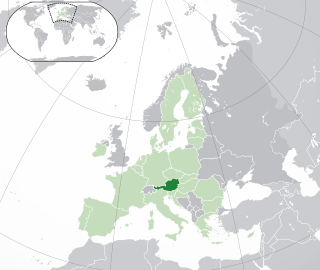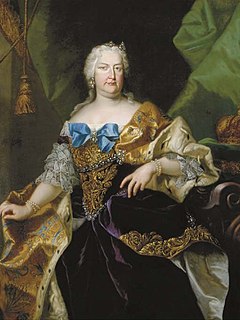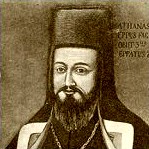
Baron Diego Lopes Pereira d'Aguilar (born 1699 Portugal; died 10 August 1759, London) was an Austro-English Jewish businessman, community leader and philanthropist, originally a Portuguese converso, who lived in the 18th century.

Baron Diego Lopes Pereira d'Aguilar (born 1699 Portugal; died 10 August 1759, London) was an Austro-English Jewish businessman, community leader and philanthropist, originally a Portuguese converso, who lived in the 18th century.
In 1722 he went from Lisbon to London, and then to Vienna. From 1725 to 1747 he held the tobacco monopoly in Austria, and had the power to establish factories and regulate prices. When in 1747 he asked the government to return to him a part of the money that he had deposited on account of the revenues, the empress Maria Theresa replied: "This appears to me just. I owe him much more; therefore, return it to him." D'Aguilar was a great favorite with the empress, who commissioned him to rebuild and enlarge the imperial palace at Schönbrunn, and he advanced 300,000 florins for the work.
In recognition of his services Maria Theresa created him a baron and privy councillor to the crown of the (Austrian) Netherlands and Italy. He was a Baron of the Holy Roman Empire. D'Aguilar, who together with his family enjoyed the greatest freedom of belief, was the founder of the Spanish or Turco-Jewish community in Vienna, and succeeded in obtaining many concessions for the relief of his oppressed fellow worshippers. As a result of his efforts the Jews of Moravia were protected from pillage in 1742, and the intention of Maria Theresa to expel the Jews from the whole of the Austrian empire, in 1748 or 1749, was abandoned. He left Vienna suddenly in 1749, because the Spanish government demanded his extradition. He went to London. Before leaving Vienna he presented the community which he had founded, as well as the Spanish-Jewish community of Temesvar, with beautiful silver crowns for the scrolls of the Law, upon which his name was inscribed. On the Day of Atonement a prayer is still said for the repose of his soul by the Turco-Jewish community of Vienna.
He matriculated his arms: Gules an eagle Or beneath a plate, on a chief Argent three hillocks Vert on each a pear Or slipped Vert. The crest is a demi-lion proper, wearing a castellation Azure on its head and holding a sprig of leaves Vert in its right paw.
He married, 1722, Donna Simha da Fonseca (died 1755) and had issue including Ephraim Lópes Pereira d'Aguilar, 2nd Baron d'Aguilar. One of his grandsons was Emanuel Lousada, who owned slave plantations in Jamaica and Barbados. [1]

Maria Theresa Walburga Amalia Christina was the only female ruler of the Habsburg dominions and the last of the House of Habsburg. She was the sovereign of Austria, Hungary, Croatia, Bohemia, Transylvania, Mantua, Milan, Lodomeria and Galicia, the Austrian Netherlands, and Parma. By marriage, she was Duchess of Lorraine, Grand Duchess of Tuscany and Holy Roman Empress.

Maximilian II, also known as Max Emanuel or Maximilian Emanuel, was a Wittelsbach ruler of Bavaria and a Prince-elector of the Holy Roman Empire. He was also the last governor of the Spanish Netherlands and duke of Luxembourg. An able soldier, his ambition led to conflicts that limited his ultimate dynastic achievements.

Francis I was Holy Roman Emperor and Grand Duke of Tuscany, though his wife, Maria Theresa, effectively executed the real powers of those positions. They were the founders of the Habsburg-Lorraine dynasty. From 1728 until 1737 he was Duke of Lorraine. Francis traded the duchy to the ex-Polish king Stanisław Leszczyński in exchange for the Grand Duchy of Tuscany as one of the terms ending the War of the Polish Succession in November 1738. The duchy and the ducal title to Lorraine and Bar passed to King Louis XV of France upon Leszczynski's death in 1766, though Francis and his successors retained the right to style themselves as dukes of Lorraine and Bar.

Thomas Robinson, 1st Baron Grantham,, of Newby, Yorkshire, was a British diplomat and politician who sat in the House of Commons between 1727 and 1761.

Baron Franz von der Trenck was an Austrian soldier.

Mikulov is a town in the South Moravian Region of the Czech Republic.

Ephraim Lópes Pereira d'Aguilar was the second Baron d'Aguilar, a Barony of the Holy Roman Empire.

The history of the Jews in Austria probably begins with the exodus of Jews from Judea under Roman occupation. Over the course of many centuries, the political status of the community rose and fell many times: during certain periods, the Jewish community prospered and enjoyed political equality, and during other periods it suffered pogroms, deportations to concentration camps and mass murder, and antisemitism. The Holocaust drastically reduced the Jewish community in Austria and only 8,140 Jews remained in Austria according to the 2001 census, but other estimates place the current figure at 9,000, 15,000 and 20,000 people, if accounting for those of mixed descent.

Major-General Sir George Charles d'Aguilar, ; January 1784 – 21 May 1855), was a British Army officer who served as Lieutenant Governor of Hong Kong (1843–1848).
Moses Mendes da Costa, also called Anthony da Costa, was an 18th-century English banker.

Elisabeth Christine of Brunswick-Wolfenbüttel was Princess of Brunswick-Wolfenbüttel, Holy Roman Empress, German Queen, Queen of Bohemia and Hungary; and Archduchess of Austria by her marriage to Emperor Charles VI. She was renowned for her delicate beauty and also for being the mother of Empress Maria Theresa. She was the longest serving Holy Roman Empress.

Maria Josepha of Bavaria was Holy Roman Empress, Queen of the Romans, Archduchess of Austria, Grand Duchess of Tuscany, etc. by her marriage to Joseph II, Holy Roman Emperor. By birth, she was a Princess and Duchess of Bavaria as the daughter of Charles VII, Holy Roman Emperor, Elector of Bavaria, and Archduchess Maria Amalia of Austria.

Wilhelmine Amalia of Brunswick-Lüneburg was Holy Roman Empress, Queen of the Germans, Queen of Hungary, Queen of Bohemia, Archduchess consort of Austria etc. as the spouse of Joseph I, Holy Roman Emperor.

Archduke Charles Joseph of Austria was the second son of the Habsburg ruler Empress Maria Theresa I and her husband, Francis of Lorraine.
Tolerance tax (Toleranzgebührer) was a tax that was levied against Jews of Hungary, then part of the Austrian Empire, between 1747 and 1797.

Atanasie Rednic (1722–1772) was Bishop of Făgăraş and Primate of the Romanian Greek Catholic Church from 1765 to his death in 1772.
Abraham Mendel Theben was the head of the Jewish community in the Kingdom of Hungary.

Johann Georg Adam Graf von Starhemberg, since 1765 Fürst von Starhemberg was an Austrian diplomat, minister, chief chamberlain and close confidant of Empress Maria Theresa
Meir Amigo was Sephardi Jew who lived in the second half of the eighteenth century at Temesvar, Hungary. He was nicknamed el rey chico on account of his wealth, and was highly respected at the court of Maria Theresa.
Emanuel Lousada was a London-born Jewish merchant, slave plantation owner and public office holder with interests in Jamaica and Barbados. He was the High Sheriff of Devon from 1842 until 1843, making him the first Jew to hold the title in a county outside of the Sheriff of London, which had been held first by David Salomons in 1835. Lousada was associated with Peak House, Sidmouth. Lousada owned more than 400 Africans slaves on his sugarcane plantations in the British West Indies at the time of the Slavery Abolition Act 1833. He died a wealthy man, leaving £100,000 in his will.